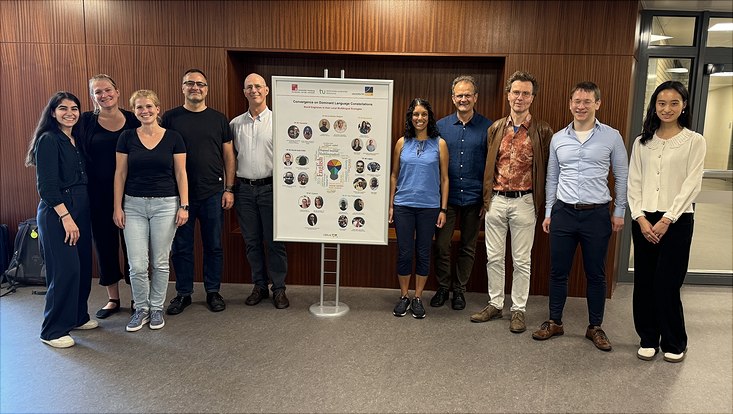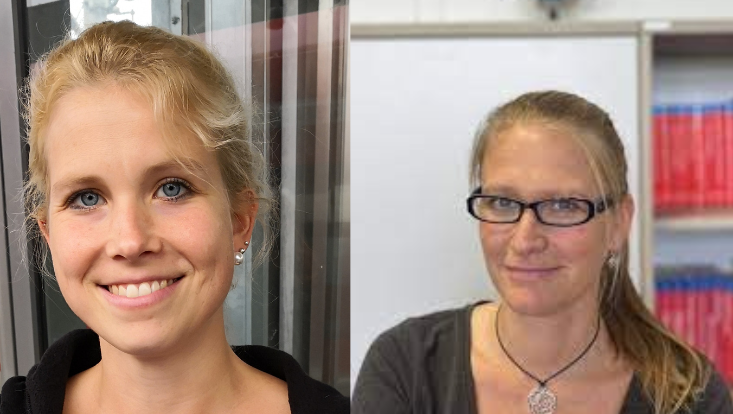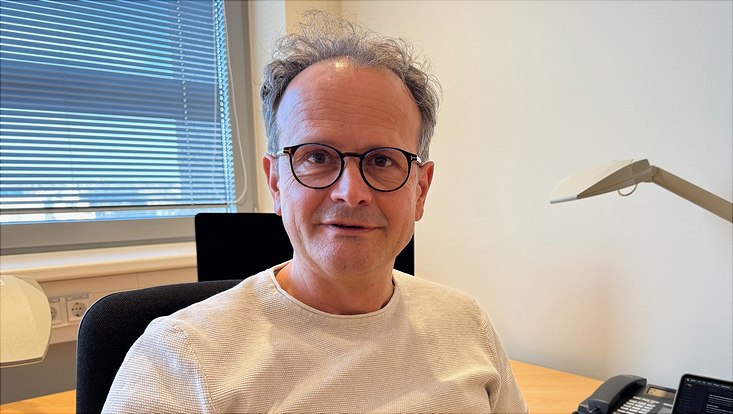Forschungsgruppe FOR 5728 CODILAC
Convergence on Dominant Language Constellations: World Englishes in their local multilingual ecologies (CODILAC)
The Research Unit compares the role of English in seven representative and heterogenous multilingual world regions. We juxtapose Botswana, Cebu City (the Philippines), Cyprus, Kurdistan Region (Iraq), Lagos (Nigeria), North-East India, and Tanzania. The Research Unit works directly with local informants based on questionnaires and personal interviews. It produces comprehensive and comparable data sets that are enriched with extensive socio-economic background, ethnographic, and language use information.
The comparison is based on the concepts of multilingual ecologies, language repertoires, and Dominant Language Constellations (DLCs). The Research Unit postulates and searches for common sociolinguistic patterns and outcomes of language contact, migration, and globalization, but is also interested in the unique local characteristics and differences.
Project leaders
- Sarah Buschfeld: “English within the multilingual ecology of divided Cyprus”, TU Dortmund University
- Manuela Vida-Mannl: “English within the multilingual ecology of divided Cyprus”, TU Dortmund University
- Robert Fuchs: “English as a local lingua franca in the multilingual ecology of Northeast India”, University of Bonn
- Roland Kießling: “English in the multilingual ecologies of Tanzania”, University of Hamburg
- Ludwig Paul: “The Kurdistan Region’s language ecology: The shift from Kurdish to English”, University of Hamburg
- Sheena Shah: “English in the multilingual ecologies of Botswana”, University of Hamburg
- Henning Schreiber: “English in selected Local Government Areas of the multilingual ecology of Lagos (Nigeria)”, University of Hamburg
- Peter Siemund: “English in the multilingual ecology of the Philippines: Exploring the sociolinguistics of Cebu City”, University of Hamburg

UHH/privat
Projects

UHH/privat
This project investigates the role, status, and functions of English within the multilingual ecology of the divided Mediterranean island of Cyprus. It specifically focuses on how English interacts with the multiple other languages of the island as one part of its multilingual ecology. The non-prototypical development of English in post-colonial Cyprus and the current socio-political situation, i.e., the division of the island and the complex sociolinguistic dynamics resulting from this division, have caused research on English in Cyprus to remain scarce.
This project draws on systematically collected, unprecedentedly rich data that promise a new understanding of the specifics behind individual multilingual ecologies and their relation to other local contexts. Examining the impact of socio-political and identity factors on the use and status of English and other local languages in Cyprus contributes to developing an inclusive theoretical approach to the global use of English in its various local multilingual ecologies.

Photo: Frommann
Northeast India is a region of exceptional linguistic diversity within India, the world’s most populous nation and a rapidly growing economy. English and Hindi function as national lingua francas, with English more widely used in Northeast India compared to other regions, alongside Assamese as a regional lingua franca.
This project examines the linguistic ecology of Northeast India, using a stratified sample of 180 participants. Participants will complete detailed questionnaires about linguistic practices and attitudes, with 60 also participating in semi-structured interviews. These interviews will form part of a corpus for further analysis. We anticipate Dominant Language Constellations (DLCs) in Northeast India to feature more languages than other locales in the Research Unit, often involving English, Hindi, and Assamese.
Language repertoires and DLCs are expected to correlate with socioeconomic status, with lower- and middle-status speakers displaying larger repertoires influenced by their L1s and other languages. Migration is also expected to shape distinct DLCs. This study adds a critical perspective to under-researched linguistic diversity in Northeast India, shedding light on how India manages its multilingual ecology amidst rapid economic growth and historic marginalization.
These insights have global relevance for understanding linguistic diversity in evolving socio-economic contexts.

UHH/privat
Tanzania is a multilingual society in which English competes with an officially established African language, Swahili, in the top layer of a macro-ecology that comprises more than 120 languages in total. Our project seeks to understand how Tanzanians navigate their languages in everyday practice with a particular focus on the role of English, its forms and the way both are shaped by local ethnolinguistic constellations beneath the surface of Swahili. In order to overcome the current research bias towards language use of the urban elites, we will rather focus on a variety of ethnolinguistically diverse settings at the rural Tanzanian grassroot level.

UHH/privat
The project aims to investigate the multiple historical, linguistic, cultural, social and political factors that determine the linguistic situation of the autonomous Kurdistan Region of Iraq (KRI) today and that are responsible for the recent rise of English. The special features of Kurdish lie in the linguistic-cultural and to some extent also political emancipation that is possible for a Kurdish community within the KRI for the first time in modern history, and in the tension between self-determination, political reality and economic-social constraints.
Linguistic questions and problems such as the relationship between the two main Kurdish varieties (Badinani and Sorani) and the relationship between Kurdish and Arabic and English are embedded in these contexts. English, as a promise of modernity and prosperity, may become a greater threat to Kurdish cultural identity in the near future than the attempts at Arabisation by the Iraqi state, which Kurds have bravely fended off for decades. The discourse on this topic within Kurdish society is also taken into account and lends the project additional social relevance.

Photo: Martí Albesa
This project investigates the role of English in Botswana, focusing on its status, functions, and societal attitudes within the country’s multilingual ecologies. English, the de facto official language, is predominantly used by a small, educated urban elite, while Setswana, the de facto national language, is widely spoken as a first language and learned by most other citizens as a second language. English provides opportunities for social and economic mobility, whereas Setswana fosters national unity and social cohesion.
In addition, dozens of minority languages are largely confined to home use, with minimal presence in public domains. The study expands on previous research which focused on the educated elite in Gaborone, Botswana’s capital, by incorporating participants from various social backgrounds across three urban centres: Gaborone, Maun, and Ghanzi.
Through sociolinguistic surveys and interviews, the project examines language use, ideologies, and attitudes, culminating in the creation of a digital corpus of “Botswana English”. The project aims to document Botswana’s multilingual ecology and contribute to discussions on language dynamics in diverse multilingual settings.

UHH/privat
In Nigeria, where about 500 languages coexist, Nigerian Standard English serves as the dominant language in media and education. There is limited research on the English varieties and language attitudes among middle-class speakers in diverse urban areas. In Lagos, a major economic hub with a population of approximately 20 million, Nigerian Standard English coexists with local languages and Nigerian Pidgin English. While Standard English plays a significant in business and administration, it competes with Yoruba, Hausa, Igbo, and Pidgin English, reflecting a unique linguistic ecology.
This research project focuses on the interplay of different English varieties in Alimosho's Ikotun-Igando and Egbe-Idimu Local Community Development Areas, which differ in their economic activities. By examining language variation and attitudes, the study aims to contribute to understanding postcolonial English in this vibrant urban setting while exploring the socio-linguistic dynamics of its multilingual landscape.

UHH/privat
The project investigates the position of English in the multilingual ecology of Cebu City, located in the central part of the Philippines. English assumes important functions in Philippine society, being – for example – widely used in the education system. The Philippines count as one of the most strongly anglicized countries. Philippine English has been extensively researched and is a well-established member of the World Englishes paradigm. The project strives to advance current research in several respects.
First, in making Cebu City its research site, it focuses on the lesser explored area of the Visayas/Bisayas where Cebuano is the native and most widely used Philippine language. The national language Tagalog/Filipino plays a less prominent role there.
Second, the project considers English in the context of the other languages in Cebu City, inquiring about the repertoires, functional domains, proficiencies, speakers’ usage patterns including code switching, and attitudes in relation to all languages, not just English.
Third, the project aims to study a socio-demographically representative sample of speakers that includes people from all walks of life, levels of education, and age groups. In doing so, the project tries to move beyond the focus on social elites (especially university contexts) that underlies much current research.

